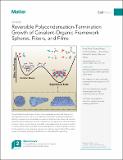Reversible Polycondensation-Termination Growth of Covalent-Organic-Framework Spheres, Fibers, and Films
Author(s)
Wang, Song; Zhang, Ziyang; Zhang, Haomiao; Rajan, Ananth Govind; Xu, Nan; Yang, Yuhao; Zeng, Yuwen; Liu, Pingwei; Zhang, Xiaohu; Mao, Qiying; He, Yi; Zhao, Junjie; Li, Bo-Geng; Strano, Michael S; Wang, Wen-Jun; ... Show more Show less
DownloadAccepted version (3.056Mb)
Publisher with Creative Commons License
Publisher with Creative Commons License
Creative Commons Attribution
Terms of use
Metadata
Show full item recordAbstract
© 2019 Elsevier Inc. Covalent organic frameworks (COFs) possessing well-defined nanopore structures can precisely control the transport of molecules through them, thereby promising applications in separations, gas storage, sensing, and catalysis. However, such applications are compromised by the low crystallinity and, thus, poor morphology control of COFs. Here, we introduce a reversible polycondensation-termination (RPT) approach. By simultaneously introducing two monofunctional competitors into reaction systems, the RPT approach selectively generates spherical, fibrous, and membranous COFs with highly ordered structures up to centimeter dimensions. The monofunctional competitors can reversibly terminate/activate the polycondensation reaction between monomers during the COF synthesis by dynamically combining with reactive functional groups of monomers. As a proof of concept, we applied the COF film to microreactions with high catalytic activities as well as rapid vapor sensor with repeatable color change.
Date issued
2019Department
Massachusetts Institute of Technology. Department of Chemical EngineeringJournal
Matter
Publisher
Elsevier BV